Organic skincare has gained immense popularity in recent years, with more people turning to natural ingredients for their beauty routines.
We’ve seen a surge in products featuring plant-based compounds, essential oils, and botanical extracts that promise to nourish and revitalize our skin. These pure, earth-derived elements can work wonders for our complexion, offering a gentler alternative to harsh chemicals while still delivering impressive results.

As we explore the world of organic skincare, we’ll discover six powerful ways to enhance our daily regimen using ingredients straight from nature’s pharmacy.
From soothing aloe vera to antioxidant-rich green tea, these natural wonders can address a variety of skin concerns and help us achieve that healthy, radiant glow we all crave.
Let’s dive into the lush garden of organic skincare and uncover the secrets to a more vibrant, naturally beautiful you.
1) Aloe Vera Gel
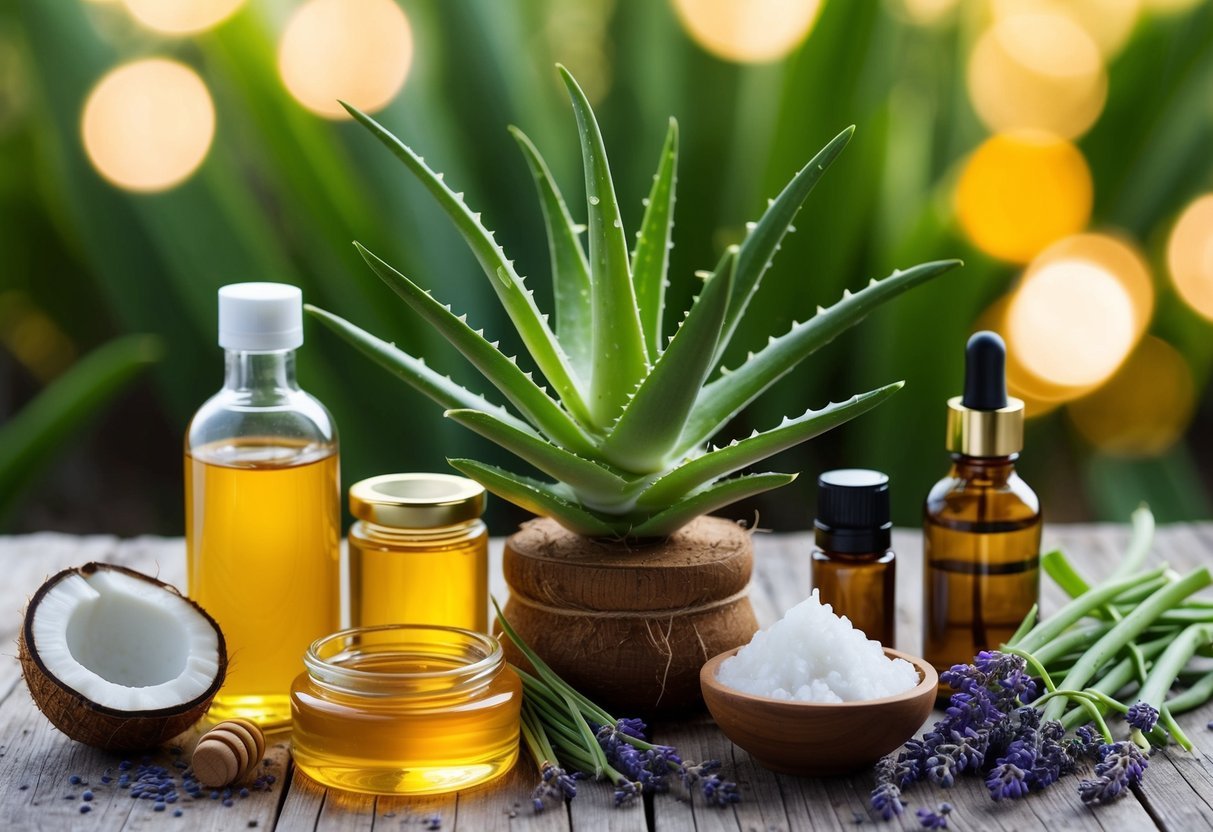
We love aloe vera gel for its amazing skincare benefits.
This natural wonder is packed with vitamins, minerals, and antioxidants that can work wonders for our skin.
Aloe vera gel is a superstar when it comes to hydration.
It’s like a drink of water for our skin, helping to keep it plump and moisturized.
Got some irritated skin? Aloe vera’s got our back.
Its soothing properties can calm inflammation and provide relief from redness or discomfort.
We’re also fans of aloe vera’s potential anti-aging effects.
It might help boost collagen production and improve skin elasticity, giving us a more youthful glow.
For the best results, we recommend looking for pure, organic aloe vera gel.
This ensures we’re getting all the good stuff without any unnecessary additives.
We can easily incorporate aloe vera gel into our skincare routine.
It works great as a light moisturizer or as a base for DIY face masks.
We can even use it to soothe sunburns or minor skin irritations.
2) Coconut Oil
We love coconut oil for its versatility in our skincare routine.
This natural wonder packs a punch with its moisturizing and nourishing properties.
One of our favorite uses is as a gentle makeup remover.
We simply massage a small amount onto our face and wipe away with a soft cloth.
Coconut oil also works wonders as a hair mask.
We apply it to our locks, leave it on for about 30 minutes, then wash out for silky smooth tresses.
For dry, chapped lips, we dab on a tiny bit of coconut oil as an ultra-hydrating lip balm.
It leaves our pout feeling soft and supple.
We’ve even found success using it as a natural deodorant.
A light swipe under our arms keeps us feeling fresh throughout the day.
At night, we like to slather some on our hands and feet before bed.
We wake up with baby-soft skin in the morning.
Remember to choose organic, unrefined coconut oil for the purest form and maximum benefits.
With so many uses, it’s a must-have in our natural beauty arsenal.
3) Shea Butter
We love shea butter for its incredible moisturizing properties.
This natural wonder comes from the nuts of shea trees in West Africa and packs a powerful punch for our skin.
Shea butter is rich in fatty acids that help lock in moisture.
It’s a godsend for dry, sensitive skin types.
We’ve found it works wonders on rough patches, leaving our skin feeling soft and supple.
But hydration isn’t all shea butter offers.
It’s also known for its anti-inflammatory qualities.
Got some irritated skin? A dab of shea butter might just do the trick.
We’re big fans of using pure, organic shea butter in our skincare routine.
It’s versatile too – we use it on our face, body, and even hair.
A little goes a long way, so a jar lasts ages.
For the best results, we look for raw, unrefined shea butter.
This ensures we’re getting all the natural goodness without any unnecessary additives.
It’s a simple yet effective addition to our organic skincare arsenal.
4) Green Tea Extract
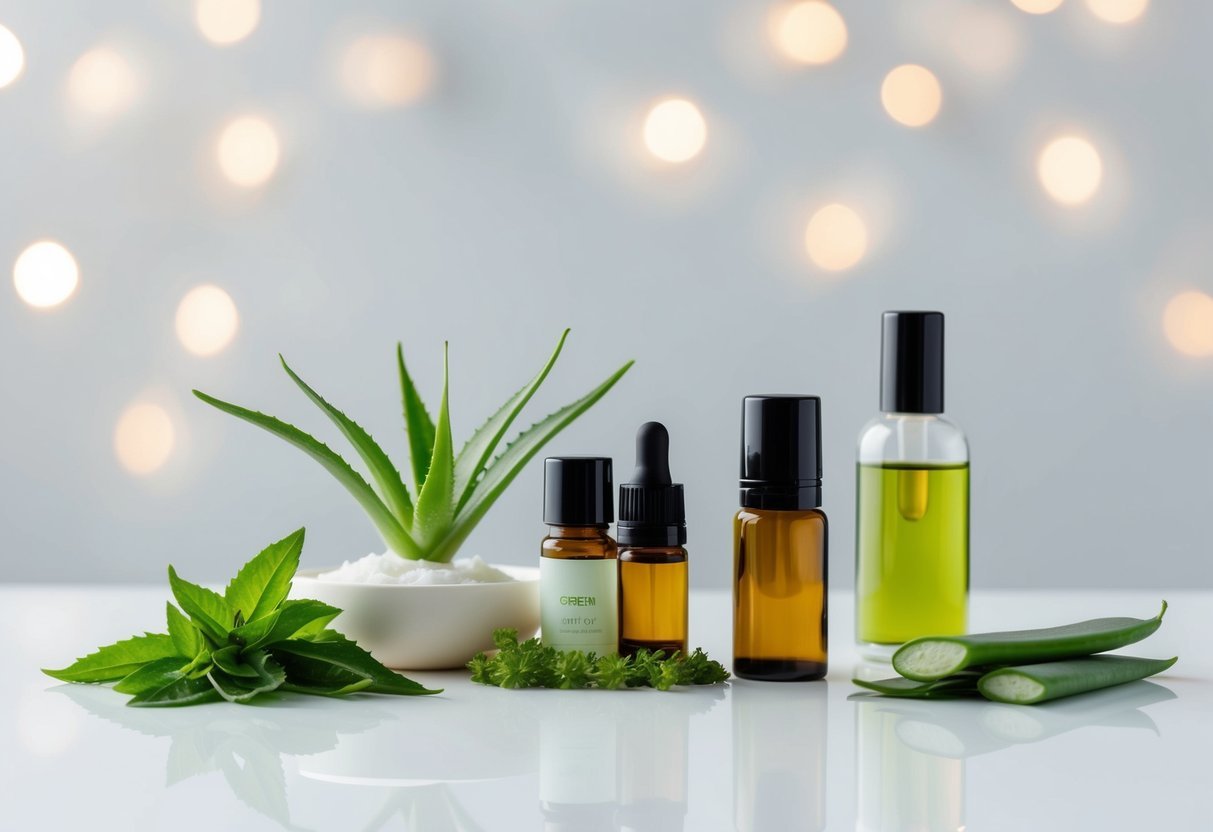
Green tea extract is a powerhouse ingredient for natural skincare.
We love how it’s packed with antioxidants that help protect our skin from environmental stressors.
This botanical wonder can work wonders for oily and acne-prone skin.
It may help reduce sebum production, keeping our faces looking fresh and matte throughout the day.
We’ve noticed that green tea extract can give our skin a soothing boost too.
Its anti-inflammatory properties can calm redness and irritation, leaving us with a more even complexion.
For those of us concerned about aging, green tea extract might be our new best friend.
It can help maintain skin elasticity, keeping our faces looking youthful and supple.
We can find green tea extract in various organic skincare products like toners, serums, and moisturizers.
It’s also easy to DIY – try steeping green tea bags in almond oil for a simple, nourishing skin treatment.
When shopping for green tea skincare, we look for products that use pure, organic extracts.
This ensures we’re getting the most benefit without any unwanted additives.
5) Rosehip Oil
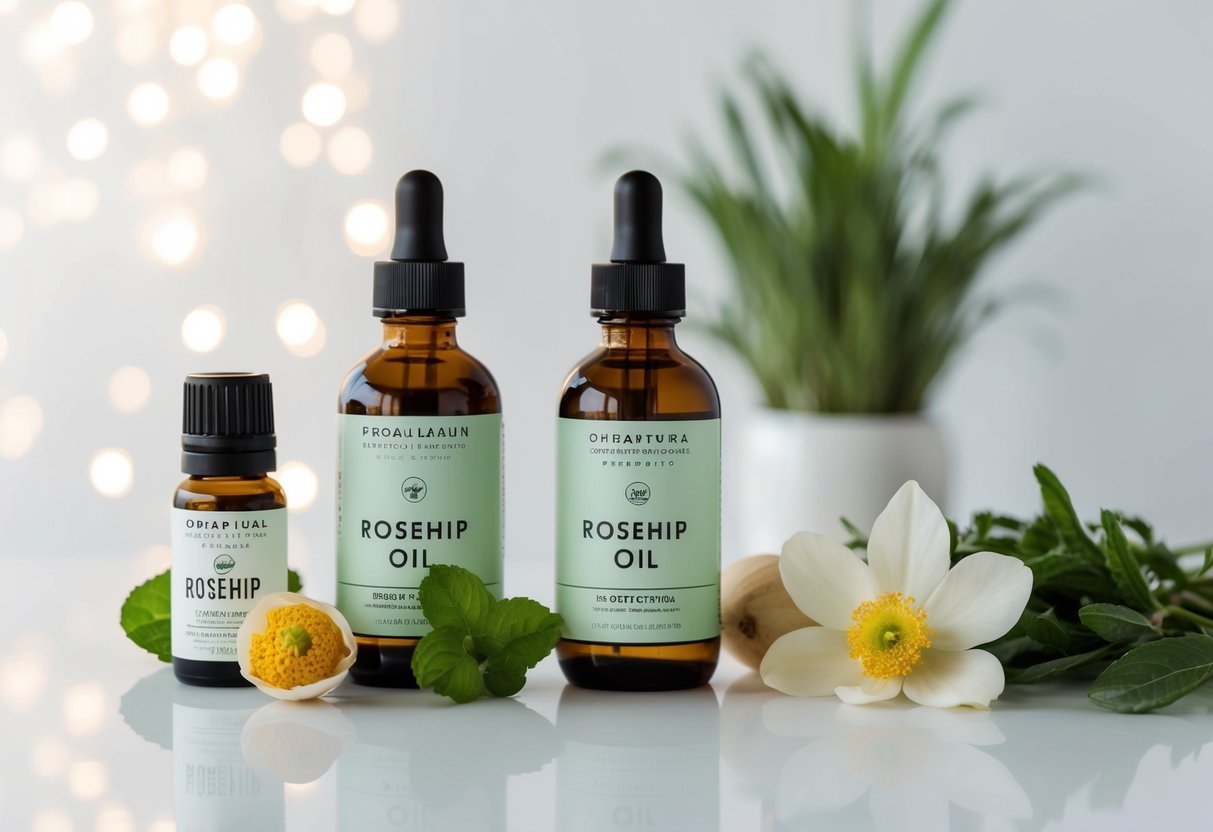
Rosehip oil is a skincare superstar that’s taking the natural beauty world by storm.
We love how this pure, organic oil packs a powerful punch for our skin.
Packed with vitamins A, C, and E, rosehip oil nourishes and revitalizes our complexion.
It’s a dream for those of us looking to even out skin tone and boost radiance.
This golden elixir is also rich in essential fatty acids.
These help keep our skin supple and hydrated, giving us that coveted dewy glow.
We’ve found rosehip oil to be a game-changer for reducing the appearance of scars and fine lines.
Its regenerative properties work wonders on our skin over time.
To use, we simply pat a few drops onto clean, damp skin.
It absorbs quickly without leaving a greasy residue, making it perfect for all skin types.
For an extra treat, we mix a drop or two into our favorite moisturizer.
This boosts its nourishing power and leaves our skin feeling silky smooth.
Remember to choose cold-pressed, organic rosehip oil for the best results.
Your skin will thank you for this natural, nutrient-rich boost!
6) Witch Hazel
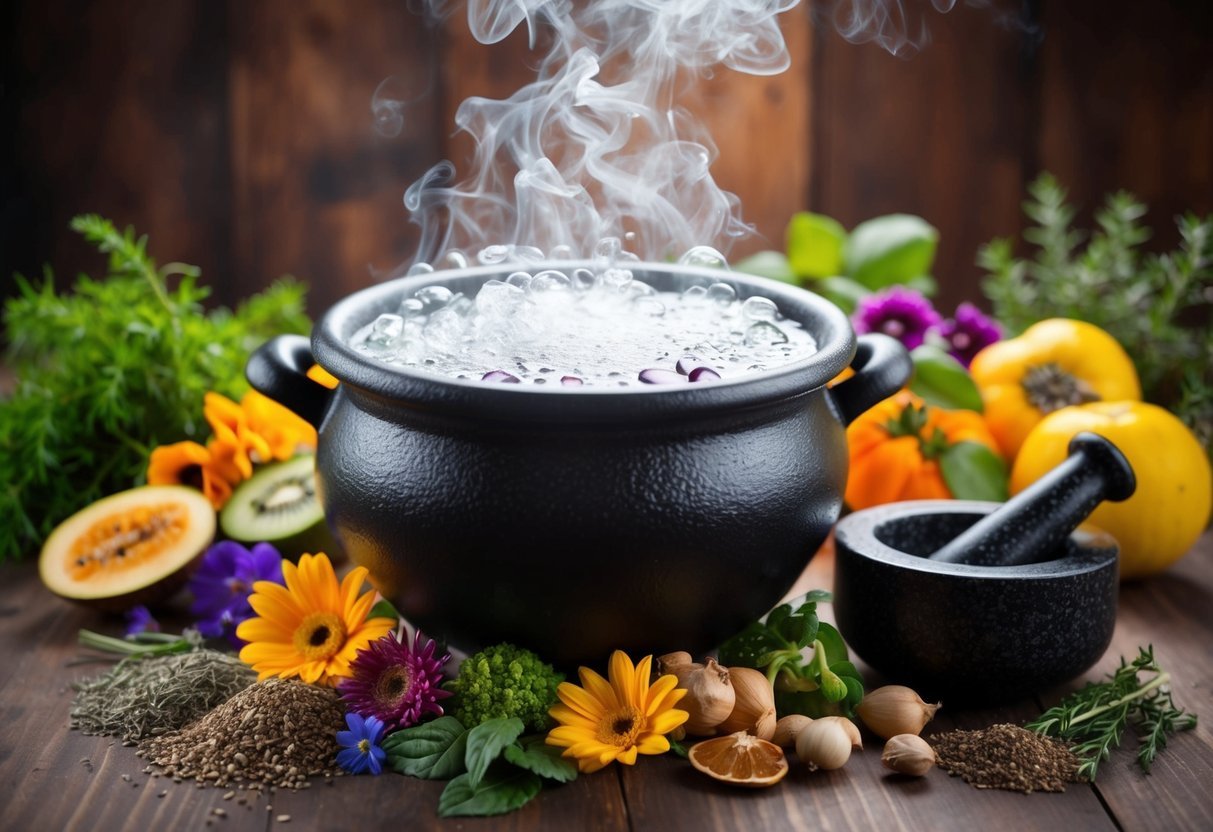
Witch hazel is a natural skincare superhero that’s been flying under the radar.
This botanical extract packs a powerful punch for your complexion.
We love using witch hazel as a gentle toner after cleansing.
It helps remove any lingering dirt or oil while tightening pores.
For those battling blemishes, witch hazel can be a game-changer.
Its natural astringent properties help reduce inflammation and fight acne-causing bacteria.
Witch hazel also soothes irritated skin.
We’ve found it works wonders on sunburns, bug bites, and razor burn.
To incorporate this miracle worker into your routine, look for pure, organic witch hazel without added alcohol.
You can apply it directly with a cotton pad or mix it into DIY face masks.
For an extra boost, try combining witch hazel with aloe vera or rose water.
This creates a soothing, hydrating toner that’s perfect for all skin types.
Remember, a little goes a long way with witch hazel.
Start with small amounts and see how your skin responds.
Your complexion will thank you!
Understanding Organic Ingredients
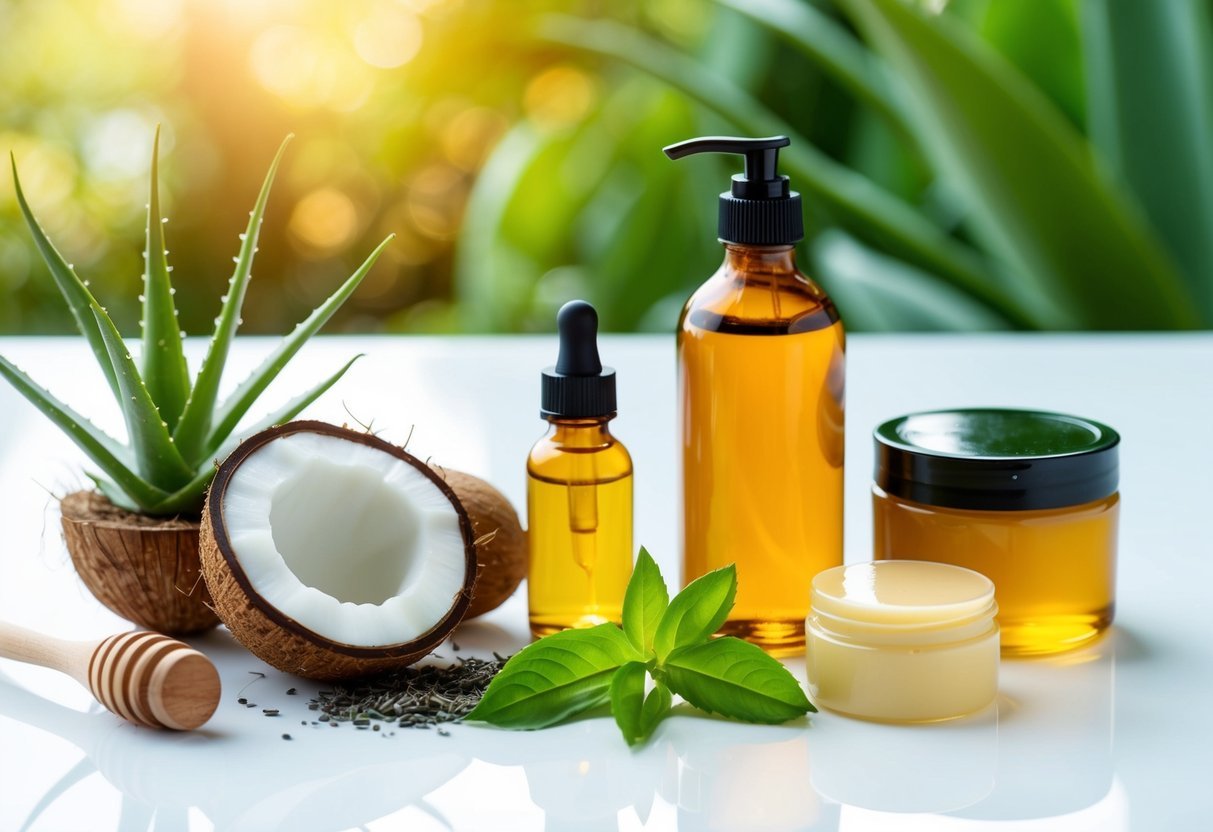
Organic ingredients are the heart of natural skincare.
They offer powerful benefits without harsh chemicals, making them ideal for nourishing and protecting our skin.
What Makes an Ingredient Organic?
Organic ingredients come from plants grown without synthetic pesticides or fertilizers.
They’re cultivated using sustainable farming methods that protect the environment.
Certification bodies like USDA Organic ensure strict standards are met.
These include no GMOs, chemical-free soil, and eco-friendly pest control.
We love that organic farming supports biodiversity.
It preserves soil health and conserves water resources too.
Benefits of Organic Over Synthetic
Organic ingredients pack a punch when it comes to skin benefits.
They’re rich in vitamins, minerals, and antioxidants that our skin craves.
We’ve noticed they’re gentler on sensitive skin types.
Unlike some synthetics, they rarely cause irritation or allergic reactions.
Organic products are free from harmful chemicals like parabens and phthalates.
This means we’re not absorbing toxins through our largest organ – our skin.
We appreciate that organic skincare is better for the planet.
It reduces pollution and supports sustainable agriculture practices.
Plus, many organic ingredients are multitaskers.
For example, coconut oil moisturizes, fights bacteria, and soothes inflammation all at once.
How to Identify High-Quality Organic Skincare Products
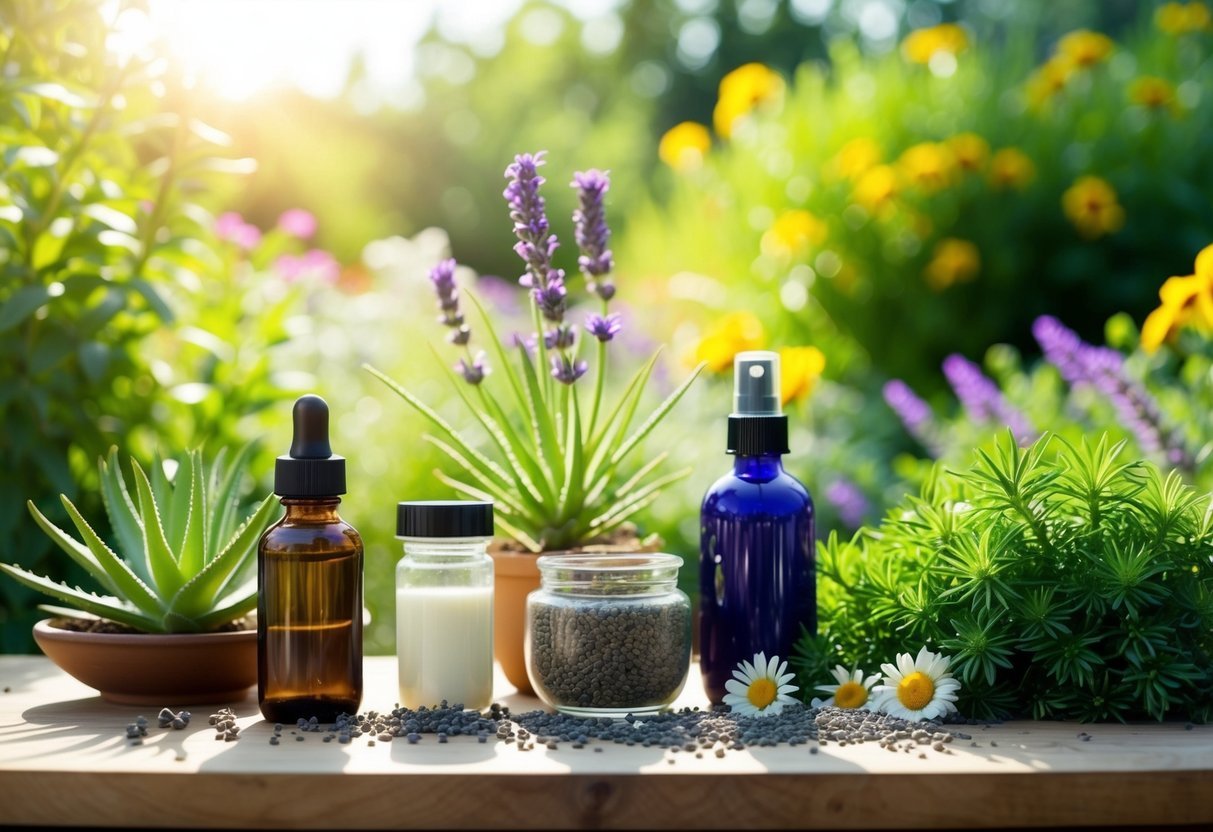
Finding truly organic skincare can be tricky.
We’ll explore how to decode labels, spot certified organic seals, and debunk common myths to help you choose the best products for your skin.
Reading Labels Effectively
When shopping for organic skincare, we always start with the ingredient list.
Natural, plant-based ingredients should dominate.
Look for familiar names like coconut oil, shea butter, and aloe vera.
Be wary of long, chemical-sounding names – these often indicate synthetic additives.
We pay attention to the order of ingredients too.
They’re listed by quantity, so the first few are the most abundant.
If water is first, the product may not be as potent as we’d like.
It’s also smart to watch out for sneaky terms. “Fragrance” can hide a multitude of synthetic chemicals.
Opt for products that specify “natural fragrance” or list essential oils instead.
Recognizing Certified Organic Seals
Certified organic seals are our friends when hunting for genuine organic skincare.
The USDA Organic seal is a gold standard – it means at least 95% of ingredients are organic.
Other trustworthy certifications include:
- COSMOS Organic
- Ecocert
- NSF Organic
These organizations have strict standards for organic ingredients and production methods.
Products with these seals have been independently verified.
Remember, “natural” doesn’t always mean organic.
We look for explicit organic claims backed by reputable certifications.
Common Misconceptions and Myths
One big myth is that all organic products are gentle and non-irritating.
While some natural ingredients can still cause reactions in sensitive skin, this is often true.
We’ve also noticed a misconception that organic skincare is less effective.
In reality, many organic ingredients are potent and scientifically proven to benefit skin.
Another myth is that organic products don’t last as long.
However, with proper formulation and natural preservatives like rosemary extract, they can have a good shelf life.
Lastly, not all organic skincare is eco-friendly.
We check for sustainable packaging and ethical sourcing practices too.
True organic beauty should care for both our skin and the planet.
Common Organic Ingredients and Their Benefits

Natural skincare ingredients offer powerful benefits without harsh chemicals.
Let’s explore some top organic options that can transform your routine.
Aloe Vera: The Natural Healer
Aloe vera is a skincare superstar.
This succulent plant packs a punch with over 130 beneficial compounds.
We love it for its soothing and hydrating properties.
Aloe gel is rich in vitamins, minerals, and antioxidants.
It can help:
- Calm irritated skin
- Boost collagen production
- Reduce the appearance of fine lines
- Even out skin tone
For sunburns or minor cuts, aloe provides quick relief.
Its anti-inflammatory effects make it great for acne-prone skin too.
Shea Butter: Moisture Powerhouse
Shea butter is a luxurious treat for dry or mature skin.
This creamy ingredient comes from the nuts of the African shea tree.
Key benefits of shea butter:
- Deep, long-lasting hydration
- Softens and smooths skin texture
- Rich in vitamins A and E
- Natural anti-inflammatory properties
We recommend using shea butter as a night cream or body moisturizer.
It’s especially helpful for rough areas like elbows and heels.
Jojoba Oil: Balancing Act
Jojoba oil is unique because it closely mimics our skin’s natural sebum.
This makes it suitable for all skin types, even oily and acne-prone.
Jojoba oil offers:
- Lightweight, non-greasy moisture
- Balances oil production
- Antimicrobial properties
- Vitamin E for antioxidant protection
We love using jojoba oil as a facial moisturizer or adding a few drops to our favorite lotions.
It absorbs quickly and doesn’t clog pores.
Frequently Asked Questions
Organic skincare offers countless benefits for achieving healthy, glowing skin.
We’ve compiled answers to common questions about incorporating natural ingredients into your beauty routine.
What at-home remedies can I use for better skin using organic ingredients?
We love whipping up DIY face masks with kitchen staples.
Try mixing honey and oatmeal for a soothing treatment.
Mashed avocado makes an excellent moisturizing mask.
For a gentle exfoliant, blend ground almonds with yogurt.
These simple recipes let us pamper our skin without harsh chemicals.
How can I create a natural skincare routine for a radiant glow?
Start by cleansing with a gentle oil like jojoba or sweet almond.
Follow with a toner made from witch hazel or rose water.
Apply a few drops of rosehip oil to nourish your skin.
Finish with shea butter as a rich moisturizer.
Consistency is key – stick to this routine morning and night for best results.
What are the top natural ingredients that help with skin whitening?
Lemon juice contains vitamin C, which can help brighten skin tone.
Turmeric has antioxidant properties that may reduce pigmentation.
Papaya enzymes gently exfoliate to reveal fresher skin.
Licorice root extract is known for its skin-lightening effects.
Always patch test new ingredients and use sun protection.
Can you recommend a natural skincare routine for someone in their 30s?
In your 30s, focus on hydration and prevention.
Cleanse with a cream cleanser containing aloe vera.
Apply a serum with hyaluronic acid and vitamin C. Use rosehip oil as a moisturizer – it’s packed with antioxidants.
Don’t forget eye cream and SPF daily.
Exfoliate weekly with a gentle scrub made from coffee grounds and coconut oil.
What are the essential steps to include in a daily organic skincare routine?
Start with a gentle cleanser to remove impurities.
Apply toner to balance your skin’s pH.
Use a serum targeted to your skin concerns.
Moisturize with a natural oil or cream.
Always finish with SPF during the day.
At night, add in treatments like retinol or face masks as needed.
Which organic skincare brands offer the most effective natural products?
We’ve had great experiences with brands like Juice Beauty, Tata Harper, and Herbivore Botanicals.
Pai Skincare is excellent for sensitive skin.
For budget-friendly options, try Acure or Pacifica.
Remember, effectiveness can vary by individual, so it may take some trial and error to find your perfect match.

